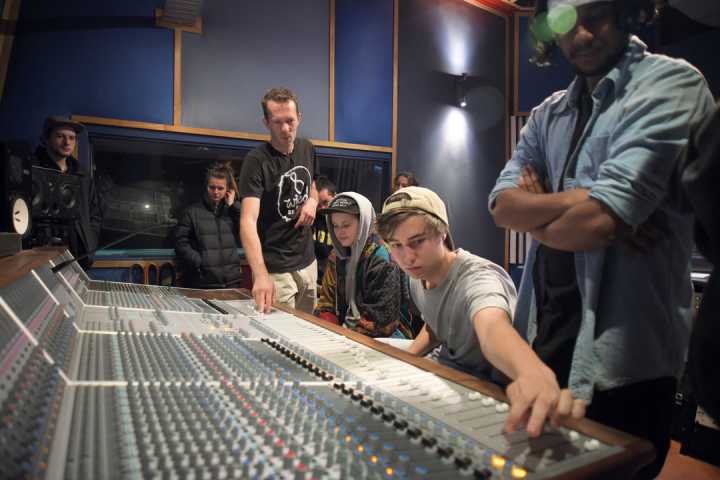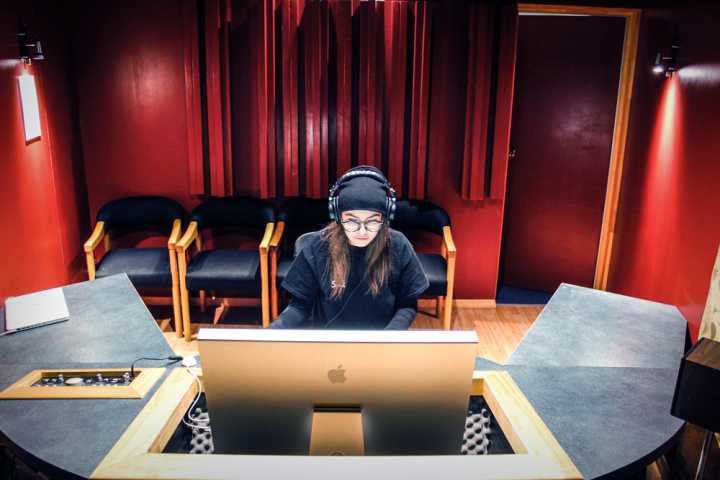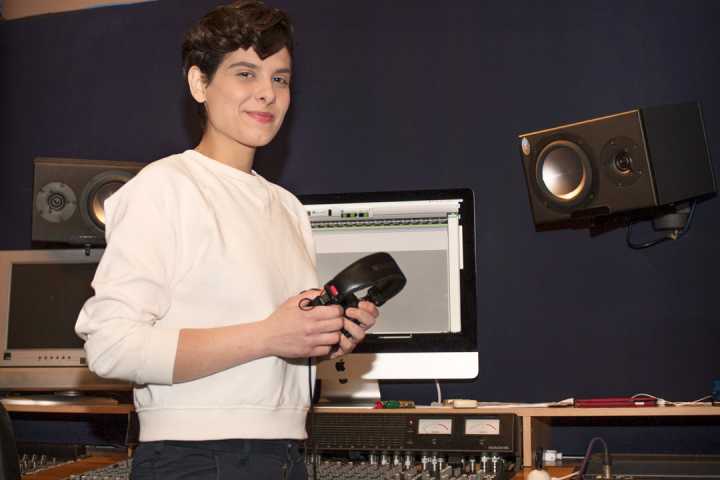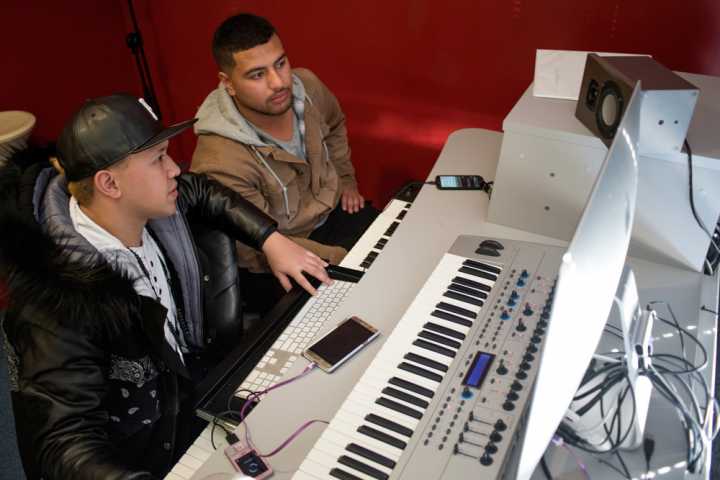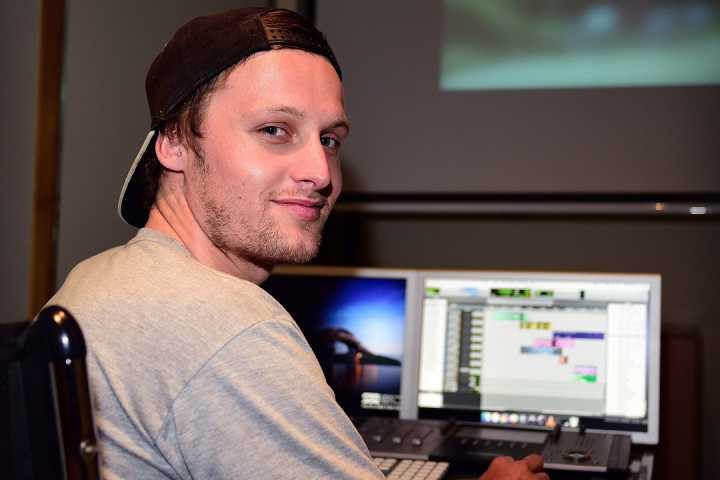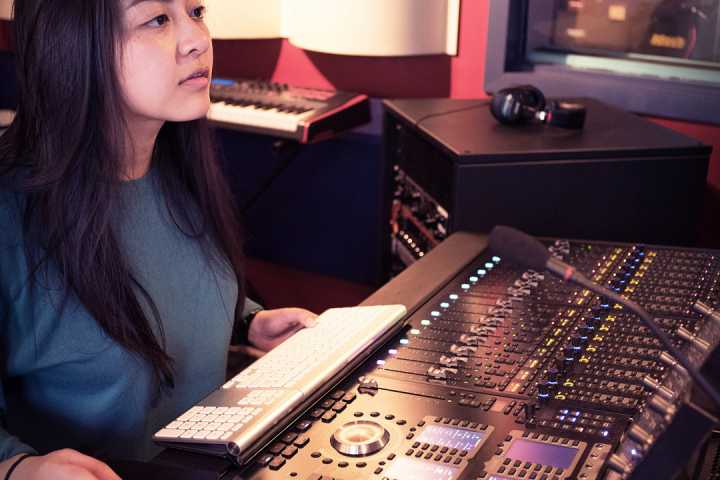SELECT A PROGRAMME
AVAILABLE IN NEW ZEALAND
-
Bachelor of Audio Production
3 YEARS FULL TIME
Develop advanced audio engineering skills for music recording, sound reproduction and commercial A/V applications.
Develop advanced audio engineering skills for music recording, sound reproduction and commercial A/V applications.
-
Diploma in Audio Production
1 YEAR FULL TIME
Engineer sound for the music and A/V industries.
Engineer sound for the music and A/V industries.
-
Bachelor of Music Production
3 YEARS FULL TIME
Develop specialised skills as a music producer for the studio and live arena.
Develop specialised skills as a music producer for the studio and live arena.
-
Diploma in Electronic Music Production
1 YEAR FULL TIME
Want to be the next big music producer? Make beats for commercial release and the stage.
Want to be the next big music producer? Make beats for commercial release and the stage.
Bachelor of Music Production
PURPOSE
Welcome to the world of music production! If you want to make beats for commercial release or take your music to the stage, this programme will help you develop the skills to chase your goals.
Over the course, you’ll be given hands-on experience using the latest tools and equipment, under the guidance of industry experts who will help you write and produce professional-quality compositions. You’ll learn about producing with music software, beat building techniques, synthesizers, samplers and drum machines.
AIM
Our expert lecturers will ensure you stay on track by providing face-to-face guidance throughout your entire course as you work to deliver real-world projects in a state-of-the-art, studio-based environment. Once complete, you’ll have just what you need to mix it with the best.
QUALIFICATION
This is an NZQA accredited programme of study that leads to the Level 7 Bachelor's Degree in Music Production.
Download a detailed information sheet here!
- Auckland
Skills and Outcomes
-
Analyse and generate solutions to unfamiliar and complex problems and issues related to key stages of music production
-
Apply an advanced level of generic skills in a range of production activities
-
Understanding the key production roles, processes and activities, and the ability to apply this understanding effectively to a range of creative and technical situations
-
Use a range of production equipment, techniques and technology to achieve complex and challenging creative goals
-
Plan and execute complex tasks either as an individual or part of a team
-
A capacity for critical, conceptual and reflective thinking, creativity and originality
-
Research skills and critical thinking towards specific problems and issues
Career Options in the Music and Audio Industries
- Music producer
- Beat maker
- Live performance
- DJ
- Post-production engineer
- Recording engineer
- Mixing engineer
- Mastering engineer
- Location recorder
- Control room designer
- Sound designer
- Foley recorder (SFX)
- Foley post sync dialogue engineer
- Technician
- Front of house sound
- Monitor engineer
- Studio manager
- System installation
- System designer
- Technician
- Hire manager
- Station manager
- Programme director
- Radio presenter
| House | Hip Hop | Professional Practice | |
| Downtempo | Hunter-Gatherer | Professional Practice | |
| Pioneer | Tirohanga | Professional Practice | |
| ReCreate: ReCompose | Zeitgeist | Professional Practice 2 | |
| Music Collaboration: Aotearoa 1 | Futurist/Anarchist | Professional Practice 2 | |
| Ko Te Ao Whānui: Music | Production Profile | Professional Practice 2 | |
| Kaupapa Māori | Creative Music Specialisation | Professional Practice 3 | |
| Music Collaboration: Aotearoa 2 | Fundamental Project Design | Professional Practice 3 | |
| Fundamental Project Production | Professional Practice 3 | ||
| House |
| Hip Hop |
| Professional Practice |
| Downtempo |
| Hunter-Gatherer |
| Professional Practice |
| Pioneer |
| Tirohanga |
| Professional Practice |
| ReCreate: ReCompose |
| Zeitgeist |
| Professional Practice 2 |
| Music Collaboration: Aotearoa 1 |
| Futurist/Anarchist |
| Professional Practice 2 |
| Ko Te Ao Whānui: Music |
| Production Profile |
| Professional Practice 2 |
| Kaupapa Māori |
| Creative Music Specialisation |
| Professional Practice 3 |
| Music Collaboration: Aotearoa 2 |
| Fundamental Project Design |
| Professional Practice 3 |
| Fundamental Project Production |
| Professional Practice 3 |
-
DURATION(S):
3 Years Full Time
-
INTAKES:
-
NEXT INTAKE:
Enrol By: N/A
Start Date: N/A
End Date: N/A
-
PROGRAMME TYPE:
Bachelor
Entry requirements
Proof of Identity
- A copy of the student's valid photo ID must be provided.
General Academic Admission
-
For Level 7 Degree programmes, candidates are required to have gained a minimum of NCEA Level 3 or equivalent
Special Admission
-
Domestic applicants aged 20 years or above who have not met the General Admission or entry requirements for a programme but whose skills, education or work experience indicate that they have a reasonable chance of success may be eligible for Special Admission. Special admission will be granted at the discretion of the Academic Manager or designated nominee. Such applicants may be required to successfully complete a foundation, bridging or tertiary introduction programme as a condition of entry into higher level programmes.
Provisional Admission
-
Domestic applicants aged under 20 years who have not met the general academic admission and entry criteria for a programme but who can demonstrate a reasonable chance of success through other educational attainment and/or work or life experience may be eligible for provisional entry at the discretion of the Academic Manager. Provisional entry places restrictions on re-enrolment to be lifted if the applicant’s performance is deemed satisfactory by the Academic Manager.
English as an Additional Language Applicant requirement
-
English as an Additional Language (EAL) applicants, including NZ Residents must meet standard NZQA minimum English Proficiency Outcomes for a diploma programme, i.e. for the academic version of IELTS they will require a score of 6 with no band score lower than 5.5, or acceptable equivalent as per the Code of Practice for the Pastoral Care of International Students.
An applicant must be a minimum of 17 years at the start date of the programme. Applicants aged less than 18 years old must apply with parental/guardian consent.
International students must be a minimum of 18 years of age at the time of enrolment.
All students are given the tutorial and pastoral support needed to satisfactorily engage with the academic and technical demands of the programme, and in particular students entering with the minimum qualification of NCEA Level 2.
All entry is at the discretion of the Academic Manager.
Selection Process
Where there are more applicants than the number of places available a selection process may be applied. An offer of place in a diploma or degree programme would be extended to applicants who meet the entry criteria and demonstrate the potential to successfully complete the programme on the basis of:
-
A portfolio of work that represents the applicant’s level of achievement
-
An interview
-
Curriculum vitae (optional)
Applicants who submit a formal application to enrol in the programme, and who meet the entry criteria would be invited to submit a portfolio of work and participate in an interview. The purpose of the interview is to assess the applicants’ suitability for the programme. It will determine whether an applicant is offered a place in the programme, and if so, at what level of the programme the applicant will be offered a place. Applicants would be welcome to enlist whānau support.
Cross Crediting and RPL
-
Cross Crediting
Cross crediting is at the discretion of the Academic Manager and will be applied in circumstances where a student is transitioning from one programme to another. To ensure the currency of learning, cross crediting of courses will be automatic for any courses undertaken within fives years of the cross crediting.
-
Application process for RPL or credit transfer
Recognition of Prior Learning (RPL) or credit transfer applies to circumstances where a learner can demonstrate relevant and current knowledge gained through prior learning and/ or a learner is requesting credits to be transferred from a qualification with comparable outcomes.
Applicants who believe they meet the criteria for RPL or credit transfer should complete the application form and attach relevant certified documentation including official academic records and/or evidence of learning outcomes being met through previous work/life experience. An interview may also be conducted with the Academic Manager. Each application will be assessed by relevant academic staff.
Fees and Payments
Year One (Level 5)
| Administration Fee | $500 | |
| Tuition Fee | TBC | |
| Total Fees | TBC |
Year Two (Level 6)
| Administration Fee | NA | |
| Tuition Fee | TBC | |
| Total Fees | TBC |
Year Three (Level 7)
| Administration Fee | NA | |
| Tuition Fee | TBC | |
| Total Fees | TBC |
Programme fees may be paid by Student Loan.
Fees must be paid annually, prior to the commencement of study.
This programme receives funding from TEC and is NZQA approved, therefore the first year is eligible for the 'Fees Free' scheme. To determine your eligibility, visit feesfree.govt.nz
For any queries regarding payment please contact: study@sae.edu





